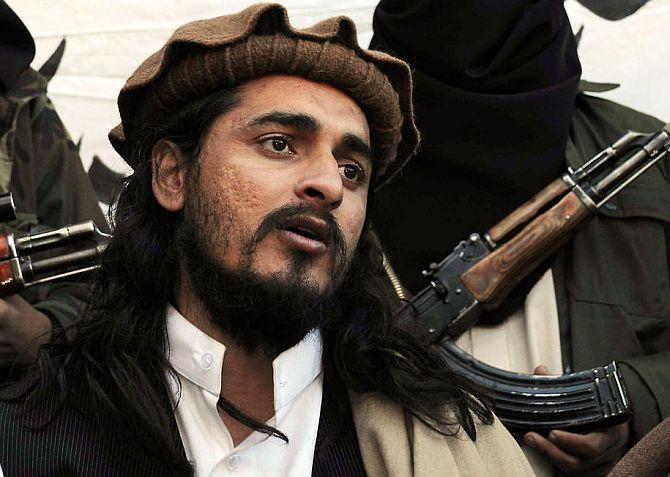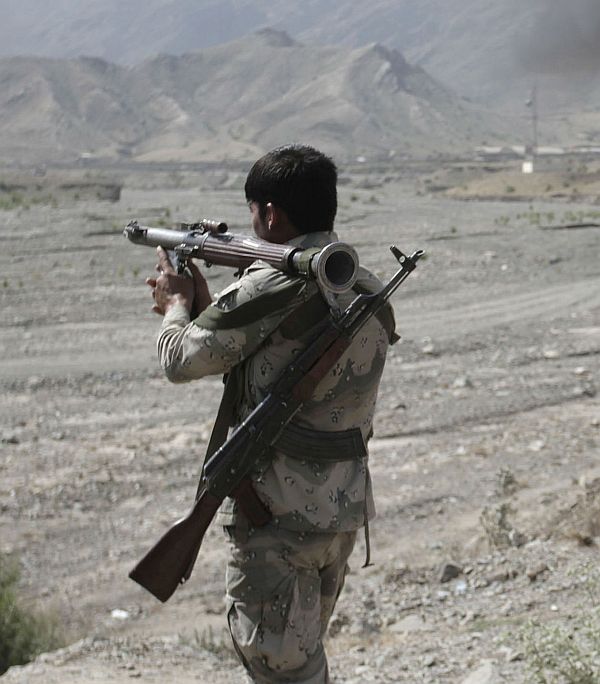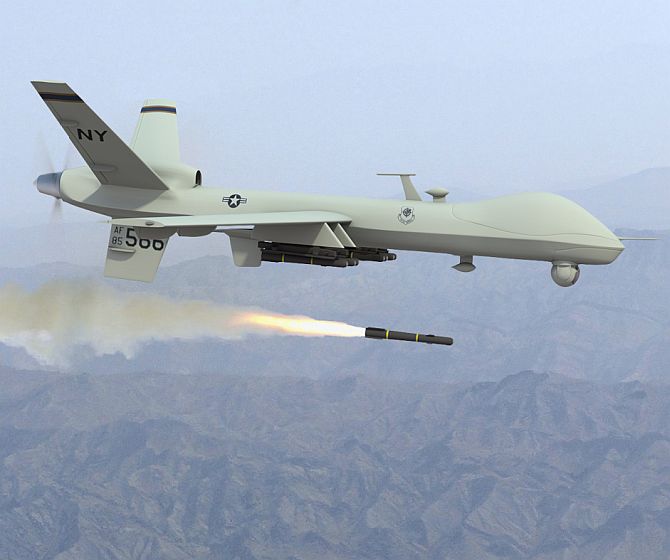
Instead of the assassination strengthening Pakistan's war against the Taliban, its leadership seems scared of taking on the terrorists, notes Sushant Sareen.
What is to be made of a society, people and country whose political leadership erupts in anger and weaves bizarre conspiracy theories because its self-declared ‘enemy no 1’ is eliminated in a drone attack by a country which has not only accorded it the status of a ‘major non-NATO ally’, but is the largest aid giver, and one of the largest trading partners, source of remittances and arms supplier?
The words ‘strategic confusion’, ‘policy disarray’, ‘social schizophrenia’ and ‘national Stockholm Syndrome’ immediately come to mind.
The drone attack on November 1, 2013, that killed Hakimullah Mehsud, emir of the Tehrik-e-Taliban Pakistan, TTP, has resulted in total reversal of roles with the US being designated as Pakistan's ‘enemy no. 1’ by top political and religious leaders in Pakistan, and Mehsud, who is responsible for the killings of thousands of Pakistani civilians and security force officials, being labelled a ‘martyr’.
While the Pakistan army has so far refrained from any comment on the drone attack on Hakimullah, there has been an almost hysterical reaction from the political and religious leadership which is not just willing to take on the US and NATO by threatening to block the Ground Lines of Communications -- some quarters are even demanding that the Pakistan air force be ordered to shoot down the drones -- but is also leaning over backwards with entreaties and pleas to the Taliban to spare them from any retaliatory terror attacks to avenge Hakimullah's killing.
There is a desperate effort underway to convince the Taliban that the Pakistan government had nothing whatsoever to do with the US attack and is genuine in its desire to enter into negotiations and dialogue with the Taliban leadership without any pre-conditions.
In fact, according to some reports, which haven’t as yet been denied, the Pakistani authorities were offering major political and economic concessions to the Taliban (virtually conceding an autonomous emirate with Dubai-like privileges for the local people of FATA) to woo them to the negotiating table.
Not only is the US being accused of deliberately sabotaging the ‘peace talks’ that the Pakistan government was set to start with the Pakistani Taliban, some leaders like Imran Khan and Jamaat Islami chief Munawar Hasan have even gone to the extent of insinuating, if not blaming, the US of being behind the major terror attacks -- the bombing of the church in Peshawar, the Kissa-Khwani bazaar bombing in Peshawar and the killing of the General Officer Commanding the 17 Infantry Division in Swat -- which followed the All Parties Conference that decided on opening a dialogue with the Taliban.
Clearly, in the minds of the Pakistani political and religious leadership it is not just that the fear of the Taliban that over-rides any fear of the US, but also their loathing for the Americans which far outweighs any such sentiment that they might harbour for the depredations and devastation caused by the Taliban.
The genuflection of the civilian establishment of Pakistan (which claims the complete backing of the military establishment in this) before the Taliban betrays, at one level, the sheer defeatism with which the Pakistani authorities are approaching the Taliban for peace negotiations. But there is also a political angle to the whole thing.
...

Interior Minister Chaudhry Nisar Ali's anti-US tirade (his wife and kids incidentally are US citizens!) has stolen the thunder from Imran Khan who has for long positioned himself as the anti-American and pro-Taliban champion in Pakistani politics.
At the same time, there are reports in the Pakistani media that Nisar was unleashed by Prime Minister Nawaz Sharif who wanted to avoid Taliban retaliation in the Punjab.
Apparently, Nawaz Sharif had received intelligence reports that over 100 Taliban suicide bombers had been placed in Punjab and were waiting to strike as soon as they received orders.
Nawaz Sharif was therefore indulging in a dissemble to defuse this threat by taking a strident anti-US position to assuage the Taliban and dissuade them from another devastating terror bombing campaign.
Politics and the pusillanimity of the politicians aside, and notwithstanding the negative impact this has on forging the elusive national consensus on how to tackle the terrorist challenge, there are other serious questions that arise from the killing of Hakimullah Mehsud.
The compound that Hakimullah was targeted in bears remarkable similarity to the Abottabad compound that Osama bin Laden lived in when he was killed by US Special Forces.
Not only did both these structures stick out like a sore thumb, they were also located right under the nose of the Pakistani military establishment -- bin Laden lived near the Pakistan Military Academy and Hakimullah a stone’s throw away from the Pakistan army's Miranshah military fort.
And yet, either out of complicity or sheer incompetence, the all-powerful Pakistan army and its infamous but powerful intelligence agencies (the ISI and Military Intelligence) were neither able to locate the world’s most wanted terrorist nor Pakistan’s ‘enemy no1’.
Even more interestingly, he was living in an area which is dominated by the ‘good Taliban’ -- the Pakistan army's ‘strategic assets’ -- namely, Hafiz Gul Bahadur and the Haqqani Network, without any let or hindrance.
This means that either the area was an undeclared ‘safe zone’ in which all combatants could live without molesting each other, or else it puts a lie into the fictitious distinction between the ‘good’ and ‘bad’ Taliban.
Another possibility is that the Pakistan army was deliberately not targeting the TTP chieftain for some sinister reason.
In all likelihood, the Americans got a fix on Hakimullah, who they were hunting ever since the bombing of the CIA base in Khost in 2009 and the botched Times Square bombing in New York by the idiot bomber Faisal Shehzad in 2010, after they captured his right-hand man Latifullah Mehsud in Logar, Afghanistan early last October.
Apparently, the Americans had given enough hints to the Pakistanis even before Nawaz Sharif’s visit to Washington in late October that they had Hakimullah in their sights and were going to take him out regardless of Pakistani reservations on drone attacks.
For the Pakistanis to now accuse the Americans of sabotaging the peace talks at the eleventh hour is somewhat disingenuous.
...

From the shrillness of the Pakistani protests, it would appear as though the ‘peace talks’ with the Taliban had reached a conclusion. The fact, however, is otherwise.
These talks had not even started. Some initial contacts had been made and some tentative understanding reached on the back channel between intermediaries of the Taliban and the government.
A delegation of Ulema was purportedly going to go to Miranshah to hand a formal invitation for talks to the Taliban. In other words, there was no real dialogue underway at the time Hakimullah was killed.
Everything else -- the Taliban accepting the invitation for talks, the terms and conditions under which the talks would proceed, what solution, if any, these talks would throw up, whether this would be a lasting solution acceptable to all ‘stakeholders’, and whether any or all of the sides would stick to their side of the bargain or renege on it -- was all pretty much in the realm of speculation.
What now remains to be seen is the impact that Hakimullah’s killing will have on the TTP and the Islamist insurgency that it is spearheading in Pakistan.
The hope among some security analysts in Pakistan is that Hakimullah’s death will deal a body blow to the TTP and could deepen the divisions within its ranks.
Hakimullah was seen as a ruthless and charismatic commander who was also a brilliant planner of attacks. Replacing him, according to these analysts, will not be easy.
Even more difficult will be to find a replacement who is able to lead all the other commanders. But if the TTP's past record is anything to go by, then this optimism is likely to be belied.
Every successive commander starting from Nek Muhammed to Abdullah Mehsud to Baitullah Mehsud to Hakimullah Mehsud had taken the insurgency to a higher level.
While there have been differences between faction leaders and operational commanders of the TTP (including the occasional internecine warfare), by and large the commanders stuck together in pursuit of their larger objective of taking over the Pakistani State, supporting Al Qaeda and the Taliban and fighting the ISAF and Pakistan army.
...

It is unlikely that this dynamic will undergo a major change with Hakimullah's death. It is possible that the TTP might agree to enter into a dialogue for reasons of gaining some tactical space; but it would be stretching incredulity to think that such a dialogue would lead to lasting peace and re-establish the writ of the Pakistani State in the territories over which the Taliban hold sway.
Instead of putting the TTP on the defensive, Hakimullah's killing coupled with the cringing appeals from the Pakistan government and political leadership to not break off the talks, has given the TTP huge advantage to arm twist the Pakistani State into making concessions even before they deign to enter into ‘peace talks’.
There is also a possibility that the TTP decides to first launch a campaign of terror to further force the Pakistani State on its knees before they decide to enter into talks, which again will be on their and not the Pakistani State’s terms.
In either case, the weak-kneed response of the Pakistani State and its desperate desire to win the peace without fighting the war is only going to strengthen the hand of the TTP and its affiliates.
While there could be a tussle for the crown of the next TTP chief, whether this struggle for power will prove devastating for the Pakistani Taliban is something that will be closely watched.
The fact that the TTP and its affiliates accept the leadership of the Afghan Taliban (Mullah Omar) could prevent differences over leadership from spinning out of control.
What is more, as an umbrella organisation, the TTP gives enough operational autonomy and space to all its commanders. This factor will also limit the potential of the leadership fight to destroy the TTP from within.
To be sure, Pakistani agencies will work overtime to sow dissensions between the various commanders. But over the years, the TTP appears to have developed the capacity and even structures to effectively counter these tactics. The next TTP chief could also divide responsibilities in a way to satisfy all the contending commanders and give them additional territories to control.
Hakimullah’s death is therefore not likely to deal a body blow to the TTP. If Pakistan wishes to reclaim the territories it has ceded to the Taliban, then it will have to use military force and combine it with a political and ideological narrative that weans away the support, both open and tacit, that is currently available to the Islamists in Pakistan.
But this will require a complete overhaul of the national mindset, something that will require clarity of thought and time, neither of which is available.
Simply put, the Pakistani State has neither the capacity nor the willingness to undertake the reforms that will enable it to defeat the Taliban.
Meanwhile, regardless of the song and dance made by the Pakistanis about the drone attacks, it is clear that this remains perhaps the most potent and effective weapon in the US arsenal to target terrorist networks, and is therefore not going to be given up anytime soon.
Pakistan will just have to learn to live with this awesome weapon, which incidentally is the only weapon system that really scares the Taliban terror groups, which is also the reason why they insist on stopping drone strikes if the Pakistani State wants negotiations.
While the Taliban's opposition to drones is entirely borne out of an instinct for self-preservation, it would seem the opposition of the Pakistani -- Punjabis really -- is the result of their instinct for self-destruction.